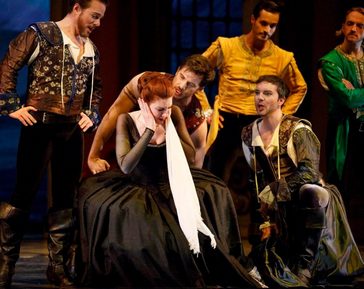 Penelope (Mireille Lebel) is beset with suitors in the Return of Ulysses.
Penelope (Mireille Lebel) is beset with suitors in the Return of Ulysses. One of these is Monteverdi’s Return of Ulysses, which returned to the Elgin Theatre this month, eleven years after it received its OA premiere. And while eleven years may seem like a long time to wait, it’s worth remembering that poor Penelope had to wait much longer for her Ulysses to return to her. That, of course, is the kernel of the story that composer Claudio Monteverdi and his librettist Giacomo Badoaro told in their opera of 1640: Ulysse’s struggles to find his way back to Ithaca from the Trojan War, and Penelope’s struggles to fend off an increasingly bold gang of suitors until he does.
Speaking of Minerva, soprano Meghan Lindsay shone brightly as the deity who helps Ulysses safely arrive home and vanquish his rivals. She brought an authoritative, god-like sense of superiority to her character – and also astonishing skills in baroque vocal ornamentation.
Indeed, the casting for this production was as strong as a chain with no weakest link. Among the comprimario roles, two standouts were the clear-voiced tenor Christopher Enns as Ulysses’ son, Telemaco, and the stentorian bass-baritone Stephen Hegedus as Neptune. Cast as Melanto and Eurimaco, respectively, soprano Carla Huhtanen and tenor Isaiah Bell, were vocally well matched. And mezzo Laura Pudwell made a strong impression in her “upstairs-downstairs” role, as Penelope’s maid, Ericlea.
OA co-artistic director Marshall Pynkoski’s staging of Ulysses was strikingly simple and direct – less elaborate that the company’s stagings sometimes are. Yet as a result, the piece was emotionally penetrating, placing the characters’ feelings front and centre. And, as always in an OA production, there was dance. Jeannette Lajeunesse Zingg’s choreography, complete with her “signature” castanets and finger cymbals, was a delightful splash of eye-candy.
Down in the pit, music director David Fallis’s work with his little orchestra – including plenty of continuo instruments such as the lute, guitar, harp, harpsichord and organ – brought Monteverdi’s score vividly to life. It might sound like a back-handed compliment to describe an opera as “bursting with recitative,” yet in UIysses, Fallis made this into a musical virtue. In his hands, the score of this baroque masterpiece was both fluid and richly detailed.
© Colin Eatock 2018
 RSS Feed
RSS Feed

